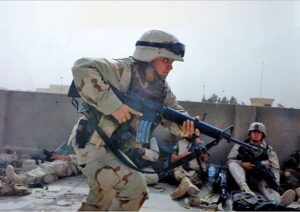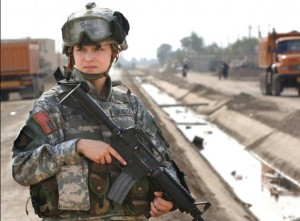Becky Kospanova
 On January 23, 2013 Defense Secretary Leon Panetta announced that the military was going to rescind an official ban on participation of women in direct combat which was put in effect back in 1994. The implementation of this decision would be gradual but is expected to be fully put in place by 2016. Under 1994 ruling, women in military were prevented from direct involvement in front-line combat in artillery, infantry, armor and similar roles. Given the large number of women enlisted in military (according to 2012 statistics provided by the Department of Defense there were 214,098 women in active duty and 118,781 women in reserve), the decision to lift the ban was certainly groundbreaking and incited a lot of discussion regarding the role women play in US military nowadays.
On January 23, 2013 Defense Secretary Leon Panetta announced that the military was going to rescind an official ban on participation of women in direct combat which was put in effect back in 1994. The implementation of this decision would be gradual but is expected to be fully put in place by 2016. Under 1994 ruling, women in military were prevented from direct involvement in front-line combat in artillery, infantry, armor and similar roles. Given the large number of women enlisted in military (according to 2012 statistics provided by the Department of Defense there were 214,098 women in active duty and 118,781 women in reserve), the decision to lift the ban was certainly groundbreaking and incited a lot of discussion regarding the role women play in US military nowadays.
The proponents of the lift of the ban assert that it would remove archaic gender-based barriers to military service and would provide women with equal opportunities, rights and responsibilities in the army. In fact, many women in the army argue that very often they were and are attached to ground combat units both in Iraq and Afghanistan without being properly recognized for it, and many women have died as a result of their involvement (according to New York Times, as of last year about 800 women were wounded and more than 130 died in service). Moreover, there would be more than 250,000 job positions open for women as a result of the annulment of the ban and women would have a better chance to improve their careers in the military where the record of combat service is frequently required for career advancement.
However, the opponents of the decision contend that women should not get involved into front-line combat because of several factors. Most often, people argue that women, simply because of biology, are not as strong physically as men to endure the hardships of direct combat. Despite the argument of the proponents of the ban that modern war is mostly push-button war and physical strength is not as important as it has been previously, physical strength matters. From carrying heavy loads and running at length it is still undeniable that a person must be physically strong to be an effective soldier. While all soldiers need to pass physical tests, the requirements differ for women and men – and men are expected to perform more strenuous tasks compared to women. In addition, many people maintain that it is important to consider psychological aspects of women being involved in front-line combat. For example, there is a possibility of sexual relationships between male and female soldiers which has the potential of affecting the efficacy and comradely spirit of the unit. Also, many people believe that men will instinctively try to protect their female counterparts and the effectiveness of their military units might be reduced as a result. Moreover, the opponents of the lift of the ban argue that it puts women in very dangerous position because women are more likely to be sexually assaulted and tortured by enemies in case of capture. Some also believe that men will have more difficulties serving under female command which will negatively affect military performance of US army.
Most often, people argue that women, simply because of biology, are not as strong physically as men to endure the hardships of direct combat. Despite the argument of the proponents of the ban that modern war is mostly push-button war and physical strength is not as important as it has been previously, physical strength matters. From carrying heavy loads and running at length it is still undeniable that a person must be physically strong to be an effective soldier. While all soldiers need to pass physical tests, the requirements differ for women and men – and men are expected to perform more strenuous tasks compared to women. In addition, many people maintain that it is important to consider psychological aspects of women being involved in front-line combat. For example, there is a possibility of sexual relationships between male and female soldiers which has the potential of affecting the efficacy and comradely spirit of the unit. Also, many people believe that men will instinctively try to protect their female counterparts and the effectiveness of their military units might be reduced as a result. Moreover, the opponents of the lift of the ban argue that it puts women in very dangerous position because women are more likely to be sexually assaulted and tortured by enemies in case of capture. Some also believe that men will have more difficulties serving under female command which will negatively affect military performance of US army.
There are many well-grounded and persuasive arguments on both sides of the dispute regarding the abolishment of the ban on women’ participation in direct combat. However, one thing which is undisputable is that American military women deserve recognition and admiration for their heroic service.

